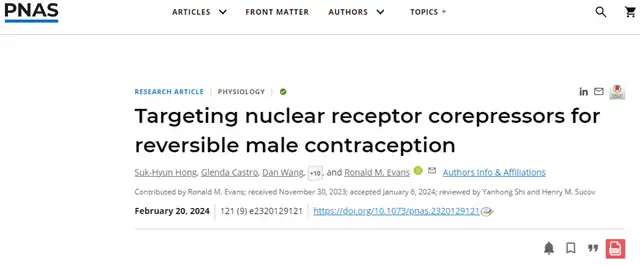New Study Reveals Potential for Reversible Male Contraceptive Pills
- Normal Liver Cells Found to Promote Cancer Metastasis to the Liver
- Nearly 80% Complete Remission: Breakthrough in ADC Anti-Tumor Treatment
- Vaccination Against Common Diseases May Prevent Dementia!
- New Alzheimer’s Disease (AD) Diagnosis and Staging Criteria
- Breakthrough in Alzheimer’s Disease: New Nasal Spray Halts Cognitive Decline by Targeting Toxic Protein
- Can the Tap Water at the Paris Olympics be Drunk Directly?
New Study Reveals Potential for Reversible Male Contraceptive Pills: A Breakthrough in Contraceptive Research
- Should China be held legally responsible for the US’s $18 trillion COVID losses?
- CT Radiation Exposure Linked to Blood Cancer in Children and Adolescents
- FDA has mandated a top-level black box warning for all marketed CAR-T therapies
- Can people with high blood pressure eat peanuts?
- What is the difference between dopamine and dobutamine?
- How long can the patient live after heart stent surgery?
New Study Reveals Potential for Reversible Male Contraceptive Pills: A Breakthrough in Contraceptive Research
“Exciting News! Breakthrough in Male Contraceptive Pills” – PNAS Study: Can be taken orally in low doses for a long period without affecting normal male reproductive function after discontinuation.
Accidental pregnancies are a significant public health issue, causing billions of dollars in losses each year in the United States alone. Therefore, scientifically sound contraception has significant social, economic, and health benefits. However, there are still relatively few contraceptive options available for men.
Recently, Dr. Evans and his team at the Salk Institute published a research article titled “Targeting nuclear receptor corepressors for reversible male contraception” in the prestigious journal PNAS.
The study found that long-term, low-dose oral administration of a histone deacetylase inhibitor to inhibit the action of the retinoic acid receptor (RAR) and thyroid hormone receptor (SMRT) complex can reversibly prevent spermatogenesis, achieving a contraceptive effect in men.
Importantly, discontinuation of the drug does not affect normal male reproductive function, demonstrating the potential development of a low side-effect, long-acting male contraceptive pill.

So, why are there so few male contraceptives available?
The lack of male contraceptives may be due to the complexity of spermatogenesis. In males, the retinoic acid receptor (RAR) regulates a series of self-renewal and differentiation programs of spermatogonial stem cells (SSCs) in the testes.
An ideal male contraceptive must inhibit spermatogenesis while preserving SSCs and not permanently damage the male reproductive system. Therefore, developing a new type of male contraceptive has always been challenging.
Role of SMRT complex in spermatogenesis
In this study, the researchers mainly used SMRTmRID transgenic mice. Compared with heterozygous control mice, male homozygous SMRTmRID mutant mice were infertile and exhibited progressive testicular degeneration and primary spermatogenic failure at around one month of age. Although sexually mature SMRTmRID mice exhibited normal mating behavior, mature sperm were almost undetectable in the epididymis. Subsequently, the researchers used this mouse model for in-depth exploration.
Since the silencing mediator of retinoic acid and thyroid hormone receptor (SMRT) is widely expressed in the entire testicular cell population and expressed most highly in supporting cells and germ cells, the researchers further analyzed the role of vitamin A and RAR signaling in MRTmRID mice.
The results suggest that the gradual loss of germ cells in MRTmRID mice may result from uncontrolled SSC differentiation, and the balance between SSC self-renewal and differentiation is crucial for sustainable spermatogenesis. Furthermore, precise control of the timing of RAR activation/inhibition is equally important for spermatogenesis.
Mechanism of contraceptive targeting the SMRT complex
To further explore the biological mechanism of RAR in MRTmRID mice, the researchers used whole-genome transcriptome analysis to determine the transcriptional changes induced by RAR ligands and all-trans retinoic acid (ATRA) in control cells and germ cells in MRTmRID mice. The results again confirmed the important role of RA in mediating SSC differentiation.
In addition, the development of round spermatids into elongated spermatids requires the synchronous replacement of histones with sperm-specific protamines in time and space. However, the researchers found significant asynchrony in the spermatogenic progress of MRTmRID mice, which was due to the loss of RA-induced spermatogenesis programs rather than simple loss of RAR target gene regulation.
Furthermore, the researchers found that although the first round of spermatogenesis before puberty in MRTmRID mice was relatively normal, immunofluorescence results for protamines and tyrosine tubulin in spermatogenic tubules showed abnormal nuclear and microtubule polarization in supporting cells. However, the blood-testis barrier (BTB) was not damaged.
Evaluation of the contraceptive effect targeting the SMRT complex
Studies have shown that the histone deacetylase (HDAC) component of the co-repressor complex can mediate the transcriptional activity inhibition of SMRT, leading the researchers to speculate that pharmacological inhibition by HDAC can phenotypically replicate epigenetic changes mediated by MRTmRID to relieve the inhibition of RAR target genes.
Therefore, the researchers analyzed the spermatogenesis process in mice using the HDAC inhibitor MS-275. The results showed that the HDAC inhibitor disrupted spermatogenesis in mice but did not reduce serum testosterone levels or the presence of SSCs.
Moreover, after 60 days of discontinuation, the mice regained fertility and produced healthy, non-malformed offspring. These results suggest that long-term oral administration of MS-275 temporarily blocks male fertility but does not permanently affect reproductive capacity or sperm genomic integrity.
In summary, the development of male contraceptives has been challenging due to the complexity of male spermatogenesis, but the researchers in this study found that relieving the inhibition of the SMRT complex signaling can achieve a contraceptive effect without affecting normal reproductive function. This opens up new avenues for the development of novel male contraceptives in the future.
New Study Reveals Potential for Reversible Male Contraceptive Pills: A Breakthrough in Contraceptive Research
(source:internet, reference only)
Disclaimer of medicaltrend.org
Important Note: The information provided is for informational purposes only and should not be considered as medical advice.



